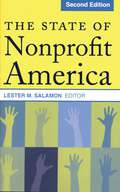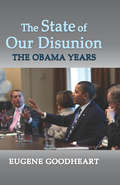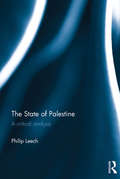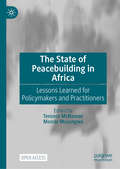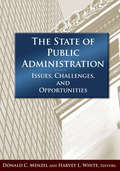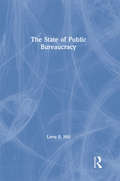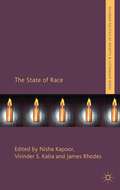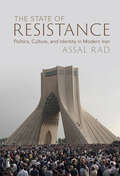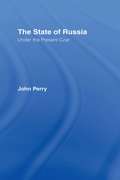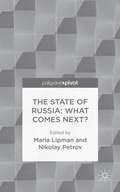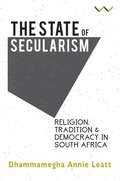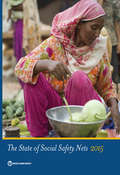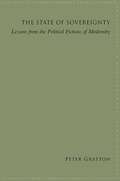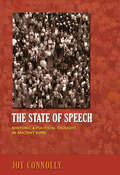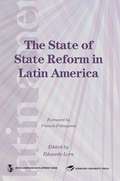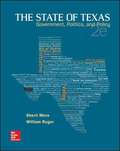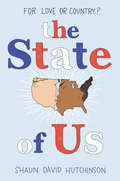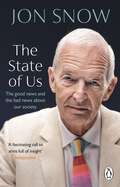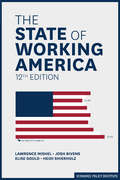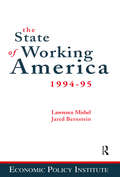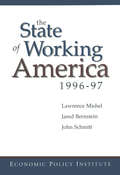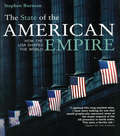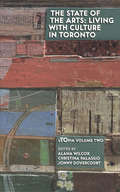- Table View
- List View
The State of Nonprofit America
by Lester M. LockwoodToday, America's nonprofit organizations seem caught in a force field, buffeted by four impulses-voluntarism, professionalism, civic activism, and commercialism. Too little attention, however, has been paid to the significant tensions among these impulses. Understanding this force field and the factors shaping its dynamics thus becomes central to understanding the future of particular organizations and of the nonprofit sector as a whole.In this second edition of an immensely successful volume, Lester Salamon and his colleagues offer an overview of the current state of America's nonprofit sector, examining the forces that are shaping its future and identifying the changes that might be needed. The State of Nonprofit America has been completely revised and updated to reflect changing political realities and the punishing economic climate currently battering the nonprofit sector, which faces significant financial challenges during a time when its services are needed more than ever. The result is a comprehensive analysis of a set of institutions that Alexis de Tocqueville recognized to be "more deserving of our attention" than any other part of the American experiment.
The State of Nonprofit America
by Lester M. SalamonToday, America's nonprofit organizations seem caught in a force field, buffeted by four impulses--voluntarism, professionalism, civic activism, and commercialism. Too little attention, however, has been paid to the significant tensions among these impulses. Understanding this force field and the factors shaping its dynamics thus becomes central to understanding the future of particular organizations and of the nonprofit sector as a whole.In this second edition of an immensely successful volume, Lester Salamon and his colleagues offer an overview of the current state of America's nonprofit sector, examining the forces that are shaping its future and identifying the changes that might be needed. The State of Nonprofit America has been completely revised and updated to reflect changing political realities and the punishing economic climate currently battering the nonprofit sector, which faces significant financial challenges during a time when its services are needed more than ever. The result is a comprehensive analysis of a set of institutions that Alexis de Tocqueville recognized to be "more deserving of our attention" than any other part of the American experiment.
The State of Our Disunion: The Obama Years
by Eugene GoodheartThe US Constitution resists centralizing authority by granting equal power to the three branches of government, as well as the individual states. The risk inherent in the separation of powers is that the absence of a spirit of compromise can lead to the disintegration of the union. Eugene Good heart argues that the current union is in peril due to an unwillingness to cooperate on the part of contending parties. He explains how and why it has reached this point, while identifying common ground between thoughtful liberals and conservatives.Ironically, President Barack Obama, who from the outset affirmed the spirit of compromise and union, has governed in a time marked by apparently irreconcilable conflict between and within parties, and the branches of the government. Those on the extremes of the political spectrum view compromise as weakness and a lack of conviction, while those in the middle view it as necessary. Good heart argues that principle and compromise are not antagonists. He also describes the media's role in shaping and distorting public perception of political realities.Many themes that preoccupy our politics and will doubtless continue to do so in the future are addressed in this work, including gross income inequality, governmental regulation of the market, the US's role as superpower, and the relationship between liberty and equality. This book will be of interest to those concerned about contemporary political life.
The State of Palestine: A critical analysis
by Philip LeechThe Palestinian national movement reached a dead end and came close to disintegration at the beginning of the present century. This critical analysis of internal Palestinian politics in the West Bank traces the re-emergence of the Palestinian Authority's established elite in the aftermath of the failed unity government and examines the main security and economic agendas pursued by them during that period. Based on extensive field research interviews and participant observation undertaken across several sites in Nablus and the surrounding area, it provides a bottom-up interpretation of the Palestinian Authority's agenda and challenges the popular interpretation that its governance represents the only realistic path to Palestinian independence. As the first major account of the Palestinian Authority's political agenda since the collapse of the unity government this book offers a unique explanation for the failure to bring a Palestinian state into being and challenges assumptions within the existing literature by addressing the apparent incoherence between mainstream debates on Palestine and the reality of conditions there. This book is a key addition to students and scholars interested in Politics, Middle-Eastern Studies, and International Relations.
The State of Peacebuilding in Africa: Lessons Learned for Policymakers and Practitioners
by Terence McNamee Monde MuyangwaThis open access book on the state of peacebuilding in Africa brings together the work of distinguished scholars, practitioners, and decision makers to reflect on key experiences and lessons learned in peacebuilding in Africa over the past half century. The core themes addressed by the contributors include conflict prevention, mediation, and management; post-conflict reconstruction, justice and Disarmament Demobilization and Reintegration; the role of women, religion, humanitarianism, grassroots organizations, and early warning systems; and the impact of global, regional, and continental bodies. The book's thematic chapters are complemented by six country/region case studies: The Democratic Republic of Congo, Rwanda, Sierra Leone, Sudan/South Sudan, Mozambique and the Sahel/Mali. Each chapter concludes with a set of key lessons learned that could be used to inform the building of a more sustainable peace in Africa. The State of Peacebuilding in Africa was born out of the activities of the Southern Voices Network for Peacebuilding (SVNP), a Carnegie-funded, continent-wide network of African organizations that works with the Wilson Center to bring African knowledge and perspectives to U.S., African, and international policy on peacebuilding in Africa. The research for this book was made possible by a grant from Carnegie Corporation of New York.
The State of Public Administration: Issues, Challenges and Opportunities
by Donald C Menzel Jay D WhiteThe trends and practices of public administration are ever changing and it is essential that they be appraised from time to time. Designed as a capstone survey of the field, The State of Public Administration focuses on leading edge issues, challenges, and opportunities that confront PA study and practice in the 21st Century.
The State of Public Bureaucracy (Bureaucracies, Public Administration, And Public Policy Ser.)
by Larry B. HillThe authors explore the many ways that gender and communication intersect and affect each other. Every chapter encourages a consideration of how gender attitudes and practices, past and current, influence personal notions of what it means not only to be female and male, but feminine and masculine. The second edition of this student friendly and accessible text is filled with contemporary examples, activities, and exercises to help students put theoretical concepts into practice.
The State of Race
by Virinder S. Kalra Nisha Kapoor James RhodesThis book analyses the nature of the contemporary racial state, exploring issues such as the nature of postraciality, racial neoliberalism, the state of multiculturalism and whiteness, alongside the functioning of state institutions and policy concerning the military, education, community surveillance, asylum and extradition.
The State of Resistance: Politics, Culture, and Identity in Modern Iran
by Assal H. RadWhile the Iranian nation-state has long captivated the attention of our media and politics, this book examines a country that is often misunderstood and explores forgotten aspects of the debate. Using innovative multi-disciplinary methods, it investigates the formation of an Iranian national identity over the last century and, significantly, the role of Iranian people in defining the contours of that identity. By employing popular culture as an archive of study, Assal Rad aims to rediscover the ordinary Iranian in studies of contemporary Iran, demonstrating how identity was shaped by music, literature, and film. Both accessible in style and meticulously researched, Rad's work cultivates a more holistic picture of Iranian politics, policy, and society, showing how the Iran of the past is intimately connected to that of the present.
The State of Russia Under the Present Czar
by John PerryThe state of Russia, under the present czar. In relation to the several great and remarkable things he has done, as to his naval preparations, the regulating his army, the reforming his people, and improvement of his countrey. Particularly those works on which the author was employ'd ... Also an account of those Tartars, and other people who border on the eastern and extreme northern parts of the czar's dominions ... To which is annex'd, a more accurate map of the czar's dominions, than has hitherto been extant. By Captain John Perry. 1716. This edition first published in 1967. Routledge is an imprint of Taylor & Francis, an informa company.
The State of Russia: What Comes Next?
by Maria Lipman Nikolay PetrovWritten by an international team of experts working on Russian development scenarios since 2007, this cutting edge Pivot examines Russia's reaction to the Ukraine crisis, and argues that subsequent decisions made by the Russian government have dashed hopes for Russia's modernization. Russia scholars whose expertise ranges from politics and economics to demographics and foreign policy analyse the changes that have occurred in Russia and address key issues such as foreign policy, the nature of the political and administrative system, the economy, relations between the centre and the regions, the state of Russian society and ideological facets of Putin's regime. Harsh confrontation with the West, isolationism within the country, militarization and increased government control of the economy, public and private space, as well as a crackdown on any independently-minded civic forces are all factors that have been rapidly obliterating gains made in the quarter of a century after the collapse of the communist regime. Both relevant and timely, this Pivot makes a key contribution to the debate on Russia's development and traces emerging trends in various spheres of Russian life, from the economy and foreign policy, to society and ideology.
The State of Secularism: Religion, Tradition and Democracy in South Africa
by Dhammamegha Annie LeattA history of global political secularism comparing religion and traditional authority in apartheid South Africa. The Dutch Reformed Church, it was said in apartheid South Africa, was the National Party at prayer, and indeed, given that the Bible was so fundamental to much of the legislation that governed the apartheid state, that apparently satirical description had the ring of truth. 'Religion in South Africa's past', writes Dhammamegha Annie Leatt has been 'saturated by politics' and politics 'saturated by religion'. So how, she asks, was it possible for a new state to found itself without religious authority? Why did the churches give up so much of their political role in the transition? How can we think about tradition and the customary in relation to secularism? How can we not? In The State of Secularism Leatt guides the reader from a history of global political secularism through an exploration of the roles played by religion and traditional authority in apartheid South Africa to the position of religion in the post-apartheid state. She analyses the negotiations relating to religion in the constitution-making process, arguing, that South Africa is both secular in its Constitution and judicial foundations and increasingly non-secular in its embrace of traditional authorities and customary law. In the final chapter Leatt turns her attention to post-apartheid South Africa, examining changing relationships between churches and the ruling African National Congress and the increasing influence of traditional leaders and evangelical Christians in an anti-liberal alliance. This book makes a tremendous contribution to the literature on postcolonial politics on the African continent. It has wonderful insights into the founding of a constitutional democracy in South African and will appeal to students in history, politics, sociology and anthropology and constitutional law.
The State of Social Safety Nets 2015
by The World BankOver the last decade, a policy revolution has been underway in the developing and emerging world. Country after country is systematically providing non-contributory transfers to poor and vulnerable people, in order to protect them against economic shocks and to enable them to invest in themselves and their children. Social safety nets or social transfers, as these are called, have spread rapidly from their early prominence in the middle-income countries of Latin America and Europe increasingly to nations in Africa, Asia and the Middle East - and today, over 130 developing countries have made investments in social safety nets an important pillar of economic development policies. The statistics and analysis in The State of Social Safety Nets 2015 capture this revolution, and reveal it in many dimensions at the country, regional, and international levels. This latest edition of a periodic series brings together a large body of data that was not previously available, drawing on the World Bank's ASPIRE database and other sources. Why have so many countries made a firm commitment to incorporate social safety nets as part of their social and economic policy architecture? Because social safety nets work. This report also reports on the rigorous evidence that demonstrates their impact, and also points the way to making them even more efficient and effective at meeting their development goals. This latest edition of a periodic series brings together a large body of data that was not previously available, drawing on the World Bank's ASPIRE database and other sources to examine trends in coverage, spending, and safety nets program performance.
The State of Sovereignty: Lessons from the Political Fictions of Modernity (SUNY series in Contemporary French Thought)
by Peter GrattonFollowing up on the fables and stories surrounding political sovereignty—once theological, now often nationalist—Peter Gratton's The State of Sovereignty takes aim at the central concepts surrounding the post-9/11 political environment. Against those content to conceptualize what has been called the "sovereign exception," Gratton argues that sovereignty underwent profound changes during modernity, changes tracked by Rousseau, Arendt, Foucault, Agamben, and Derrida. Each of these thinkers investigated the "fictions" and "illusions" of claims to sovereign omnipotence, while outlining what would become the preeminent problems of racism, nationalism, and biopower. Gratton illustrates the principal claims that tie these philosophers together and, more importantly, what lessons they offer, perhaps in spite of themselves, for those thinking about the future of politics. His innovative readings will open new ground for new and longtime readers of these philosophers alike, while confronting how their critiques of sovereignty reshape our conceptions of identity, freedom, and selfhood. The result not only fills a long-standing need for an up-to-date analysis of the concept of sovereignty but is also a tour de force engaging readers in the most important political and philosophical questions today.
The State of Speech: Rhetoric and Political Thought in Ancient Rome
by Joy ConnollyRhetorical theory, the core of Roman education, taught rules of public speaking that are still influential today. But Roman rhetoric has long been regarded as having little important to say about political ideas. The State of Speech presents a forceful challenge to this view. The first book to read Roman rhetorical writing as a mode of political thought, it focuses on Rome's greatest practitioner and theorist of public speech, Cicero. Through new readings of his dialogues and treatises, Joy Connolly shows how Cicero's treatment of the Greek rhetorical tradition's central questions is shaped by his ideal of the republic and the citizen. Rhetoric, Connolly argues, sheds new light on Cicero's deepest political preoccupations: the formation of individual and communal identity, the communicative role of the body, and the "unmanly" aspects of politics, especially civility and compromise. Transcending traditional lines between rhetorical and political theory, The State of Speech is a major contribution to the current debate over the role of public speech in Roman politics. Instead of a conventional, top-down model of power, it sketches a dynamic model of authority and consent enacted through oratorical performance and examines how oratory modeled an ethics of citizenship for the masses as well as the elite. It explains how imperial Roman rhetoricians reshaped Cicero's ideal republican citizen to meet the new political conditions of autocracy, and defends Ciceronian thought as a resource for contemporary democracy.
The State of State Reforms in Latin America
by Eduardo LoraLatin America suffered a profound state crisis in the 1980s, which prompted not only the wave of macroeconomic and deregulation reforms known as the Washington Consensus, but also a wide variety of institutional or 'second generation' reforms. 'The State of State Reform in Latin America' reviews and assesses the outcomes of these less studied institutional reforms. This book examines four major areas of institutional reform: a. political institutions and the state organization; b. fiscal institutions, such as budget, tax and decentralization institutions; c. public institutions in charge of sectoral economic policies (financial, industrial, and infrastructure); and d. social sector institutions (pensions, social protection, and education). In each of these areas, the authors summarize the reform objectives, describe and measure their scope, assess the main outcomes, and identify the obstacles for implementation, especially those of an institutional nature.
The State of Texas: Government, Politics, and Policy Second Edition
by Sherri Mora William RugerDesigned around the Texas Higher Education Coordinating Board's new Learning Outcomes and Core Objectives, The State of Texas: Government, Politics, and Policy, second edition, provides students with a comprehensive view of Texas government.
The State of Us
by Shaun David Hutchinson<P><P>When Dean Arnault’s mother decided to run for president, it wasn’t a surprise to anyone, least of all her son. But still that doesn’t mean Dean wants to be part of the public spectacle that is the race for the White House—at least not until he meets Dre. <P><P>The only problem is that Dre Rosario's on the opposition; he’s the son of the Democratic nominee. But as Dean and Dre’s meet-ups on the campaign trail become less left to chance, their friendship quickly becomes a romantic connection unlike any either of the boys have ever known. <P><P>If it wasn’t hard enough falling in love across the aisle, the political scheming of a shady third-party candidate could cause Dean and Dre’s world to explode around them. <P><P> It’s a new modern-day, star-crossed romance about what it really means to love your country—and yourself—from the acclaimed author of We Are the Ants and Brave Face, Shaun David Hutchinson.
The State of Us: The good news and the bad news about our society
by Jon Snow'A fascinating call to arms full of insight' IndependentAfter four decades broadcasting to the nation each night, Jon Snow gives vent to his opinions on the state of our nation . . . the good news and the bad newsIt is rare in history that so many nations in the developed world are in crisis at the same time. There has been a disintegration of trust in political leaders and in the media that holds them to account. For all the progress humankind has made, for all the inventions and new technologies, our society is being undermined by inequality. To fix it, we must begin by seeking out the truth about our world.In The State of Us, Jon Snow traces how the life of the nation has changed across his five-decade career, from getting thrown out of university for protesting apartheid to interviewing every prime minister since Margaret Thatcher.In doing so, he shows how the greatest problems at home and abroad so often come down to inequality and an unwillingness to confront it. But that is not our fate. Despite the challenges, Snow has witnessed profound social progress. In this passionate rallying cry, he argues that at its best, journalism reflects not just who we are now, but who we can be.We've had enough of division; the future is for us.
The State of Welfare
by Gilbert Y. SteinerThis book examines the state of public welfare in the United States.
The State of Working America
by Josh Bivens Lawrence Mishel Elise Gould Heidi ShierholzPraise for previous editions of The State of Working America: "The State of Working America remains unrivaled as the most-trusted source for a comprehensive understanding of how working Americans and their families are faring in today's economy. "-Robert B. Reich "It is the inequality of wealth, argue the authors, rather than new technology (as some would have it), that is responsible for the failure of America's workplace to keep pace with the country's economic growth. The State of Working America is a well-written, soundly argued, and important reference book. "-Library Journal "If you want to know what happened to the economic well-being of the average American in the past decade or so, this is the book for you. It should be required reading for Americans of all political persuasions. "-Richard Freeman, Harvard University "A truly comprehensive and useful book that provides a reality check on loose statements about U. S. labor markets. It should be cheered by all Americans who earn their living from work. "-William Wolman, former chief economist, CNBC's Business Week "The State of Working America provides very valuable factual and analytic material on the economic conditions of American workers. It is the very best source of information on this important subject. "-Ray Marshall, University of Texas, former U. S. Secretary of Labor "An indispensable work . . . on family income, wages, taxes, employment, and the distribution of wealth. "-Simon Head, The New York Review of Books "No matter what political camp you're in, this is the single most valuable book I know of about the state of America, period. It is the most referenced, most influential resource book of its kind. "-Jeff Madrick, author of The End of Affluence "This book is the single best yardstick for measuring whether or not our economic policies are doing enough to ensure that our economy can, once again, grow for everybody. "-Richard A. Gephardt "The best place to review the latest developments in changes in the distribution of income and wealth. "-Lester Thurow The State of Working America, prepared biennially since 1988 by the Economic Policy Institute, includes a wide variety of data on family incomes, wages, taxes, unemployment, wealth, and poverty-data that enable the authors to closely examine the effect of the economy on the living standards of the American people. This edition, like the previous ones, exposes and analyzes the most recent and critical trends in the country.
The State of Working America: 1994-95 (State Of Working America Ser.)
by Jared Bernstein Lawrence Mishel John Schmitt"A comprehensive statistical portrait of the standard of living of working Americans. ... A very interesting and useful book. It presents a wealth of statistical information in a very accessible manner". -- Journal of Economic Issues
The State of Working America: 1996-97 (State Of Working America Ser.)
by Jared Bernstein Lawrence Mishel John SchmittThe State of Working America, 1996-97 presents a statistical portrait of the standard of living of America's working families based on the most recent data available. By thoroughly analyzing areas such as family income, taxes, wages, jobs, wealth, and poverty, Mishel, Bernstein, and Schmitt show how the current economy is reflected in the lives of American workers. The new edition will update all statistical data and add a chapter on regional differences.
The State of the American Empire: How the USA Shapes the World (The Earthscan Atlas)
by Stephen BurmanAs the USA's domination of world affairs meets ever-widening international resentment, this revealing interrogation of America's global footprint explores the complexities of its impact on the world. Covering a wide range of topics - from Wall Street to the War on Terror - The State of the American Empire traces the USA's attempts to balance national interest and global responsibility. It measures America's true effect on world trade and security, locates sites of resistance and levels of antagonism, and, looking ahead, considers the sustainability of its imperial role. With full-colour maps and graphics, this is an essential resource for understanding America's power around the world.
The State of the Arts: Culture in Toronto (uTOpia)
by Alana Wilcox Christina PalassioFreakier rich people. More suburban art. A venue for new music. Better staplers. An infrastructure for hip-hop. Laneway art. More wi-fi. A more understanding marriage between art and business. Affordable live-work spaces. What would make Toronto a better place for the arts? City Hall proclaimed 2006 the Year of Creativity. 'Live With Culture' banners flap over the city. And across the city, donors are ponying up millions for the ROM and the AGO. Culture's never had it so good. Right?The State of the Arts explores the Toronto culture scene from every angle, applauding, assailing and arguing about art in our fair burg. The essays consider the big-ticket and the ticket-free, from the CNE to unintentional art. In between, you'll find thoughts on the 'creative city' and photobloggers, Toronto on film and the fine line between part and art. Taken together the thoughts of these writers, artists and city-builders create a snapshot of culture in T.O. as it grows from 'Toronto the Good' to 'Toronto the Could' to 'Toronto the Can-Do.'Includes sixteen colour pages of eye-level Toronto, and cover art by Susan Szenes.With essays by Sandra Alland, Jason Anderson, Anna Bowness, Stephen Cain, Kate Carraway, Hanna Cho, Brendan Cormier, Natalie De Vito, Liz Forsberg, Mark Fram, Marc Glassman, Katarina Gligorijevic-Collins, Brenda Goldstein, Amy Lavender Harris, Karen Hines, Sarah B. Hood, Christopher Hume, Sam Javanrouh, Dory Kornfeld, Adam Krawesky, More Or Les, John Lorinc, James MacNevin, Claudia McKoy, Brian McLachlan, Ryan McLaren, Shawn Micallef, Jill Murray, Matt O'Sullivan, Christopher Pandolfi, Michael Redhill, Dylan Reid, Damian Rogers, Stuart Ross, Lisa Rundle, Dana Samuel, Nadja Sayej, Susan Szenes, Kevin Temple, Pablo Torres, Gayla Trail, Rannie Turingan, Jason van Eyk, Adam Vaughan, RM Vaughan, Stéphanie Verge, Lisa Whittington-Hill and Carl Wilson.
